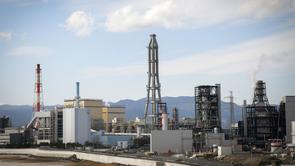 The Nakoso IGCC Power GK integrated gasification combined-cycle power plant, right, and the Joban Joint Power Co Nakoso thermal power station stand in Iwaki, Fukushima Prefecture, Japan, on Monday, Feb 3, 2020. (NORIKO HAYASHI / BLOOMBERG)
The Nakoso IGCC Power GK integrated gasification combined-cycle power plant, right, and the Joban Joint Power Co Nakoso thermal power station stand in Iwaki, Fukushima Prefecture, Japan, on Monday, Feb 3, 2020. (NORIKO HAYASHI / BLOOMBERG)
TOKYO – South Korea summoned Japanese Ambassador Koichi Aiboshi on Tuesday to protest the Japanese government’s plan to release huge amounts of contaminated water that have built up at the wrecked Fukushima plant after treatment and dilution.
Second Vice-Foreign Minister Lee Taeho conveyed Seoul's opposition to Japan's decision, expressing grave concern about potential threats to the health of South Korean people and the environment.
READ MORE: China says concerned about Fukushima water disposal
The vice-minister emphasized the need for Japan's transparent disclosure of information on the contaminated water disposal, observance of environment-related standards acceptable to the international society, and objective verification through the participation of the international community.
Koo Yoon-cheol, chief of the Office for Government Policy Coordination, said the South Korean government will convey its concerns to the international community, including the IAEA
The Japanese government announced its decision earlier in the day to release the massive amount of contaminated water into sea from the Fukushima power plant struck by an earthquake-caused tsunami in 2011.
Koo Yoon-cheol, chief of the Office for Government Policy Coordination, said during an emergency vice-ministerial meeting on Tuesday that the South Korean government "expresses strong regret and will take all necessary measures for the safety of our people."
“The decision can never be accepted and would not only cause danger to the safety and maritime environment of neighboring countries, it was also made unilaterally without sufficient consultations with our country, which is the closest neighbor to Japan.”
Koo said its government will strongly demand Japan take concrete steps “to ensure the safety of our citizens and prevent any damage to the maritime environment.”
It will convey its concerns to the international community, including the IAEA, and request it seek transparent information and international inspections over the entire process of handling the contaminated water.
ALSO READ: China seriously concerned about Fukushima water disposal
“We actively demand the Japanese government release relevant information based on our right guaranteed under international law, while working with the international community to thoroughly verify the entire water treatment process. We will never accept any behavior that could cause damage to our people,” Koo said.


